Core Ethical Issues and CSR Policies in Pharma Industry Analysis
VerifiedAdded on 2023/04/06
|10
|3233
|269
Essay
AI Summary
This essay delves into the core ethical issues prevalent in the pharmaceutical industry and the corporate social responsibility (CSR) policies adopted by firms to address them. It explores how globalization and technological advancements have intensified business competition, leading firms to prioritize profitability, sometimes at the expense of ethical practices. The essay examines specific unethical behaviors, such as inflated drug prices and questionable research and development practices. It highlights the importance of ethical considerations, CSR, and stakeholder theory in mitigating these issues and improving brand image. The paper discusses the ethical dilemmas faced by pharmaceutical companies, including the balance between profit maximization and stakeholder welfare, and the ethical implications of research and development spending. The essay provides insights into how these firms navigate ethical challenges and implement CSR initiatives to enhance their reputation and contribute to societal well-being.
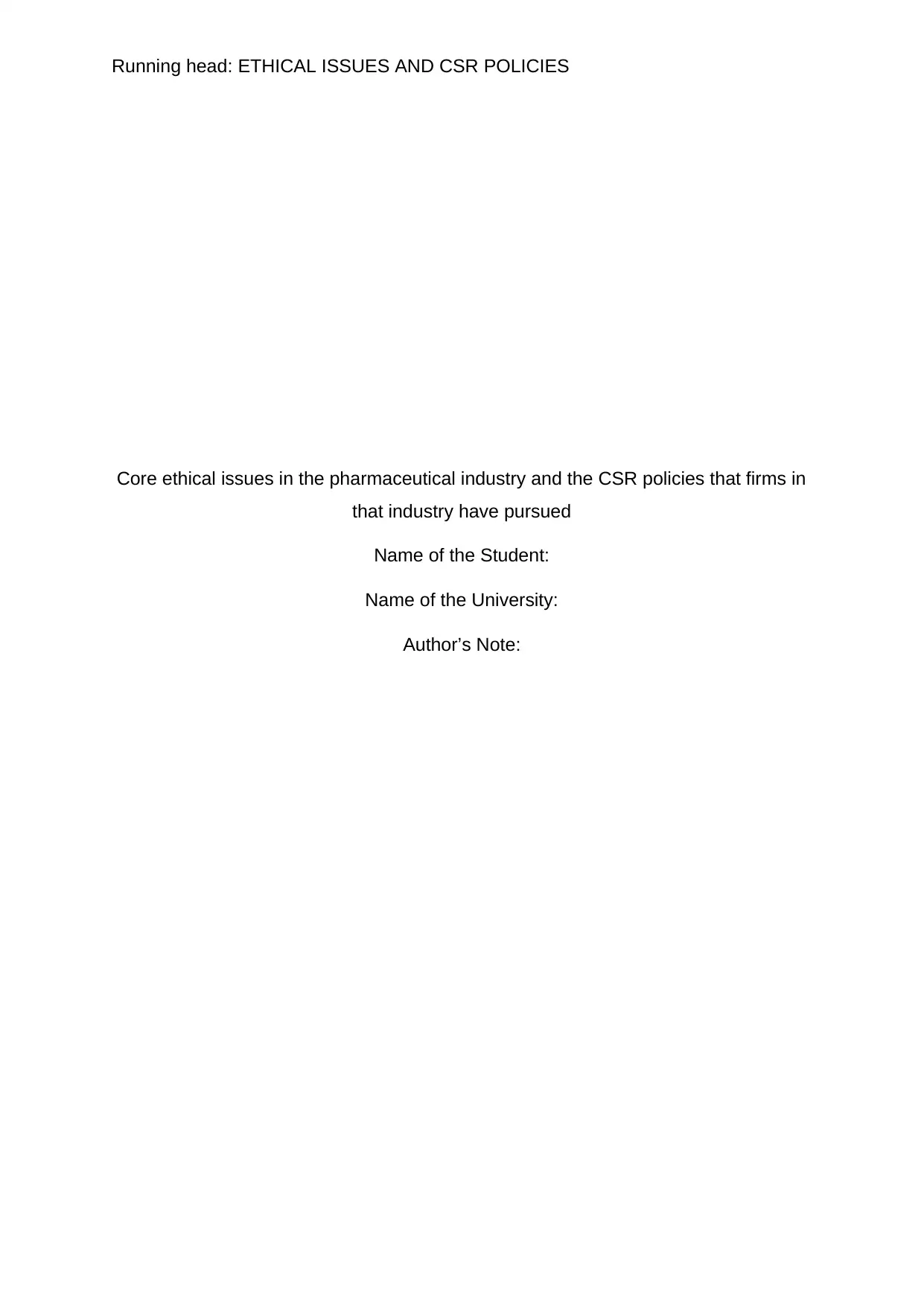
Running head: ETHICAL ISSUES AND CSR POLICIES
Core ethical issues in the pharmaceutical industry and the CSR policies that firms in
that industry have pursued
Name of the Student:
Name of the University:
Author’s Note:
Core ethical issues in the pharmaceutical industry and the CSR policies that firms in
that industry have pursued
Name of the Student:
Name of the University:
Author’s Note:
Paraphrase This Document
Need a fresh take? Get an instant paraphrase of this document with our AI Paraphraser
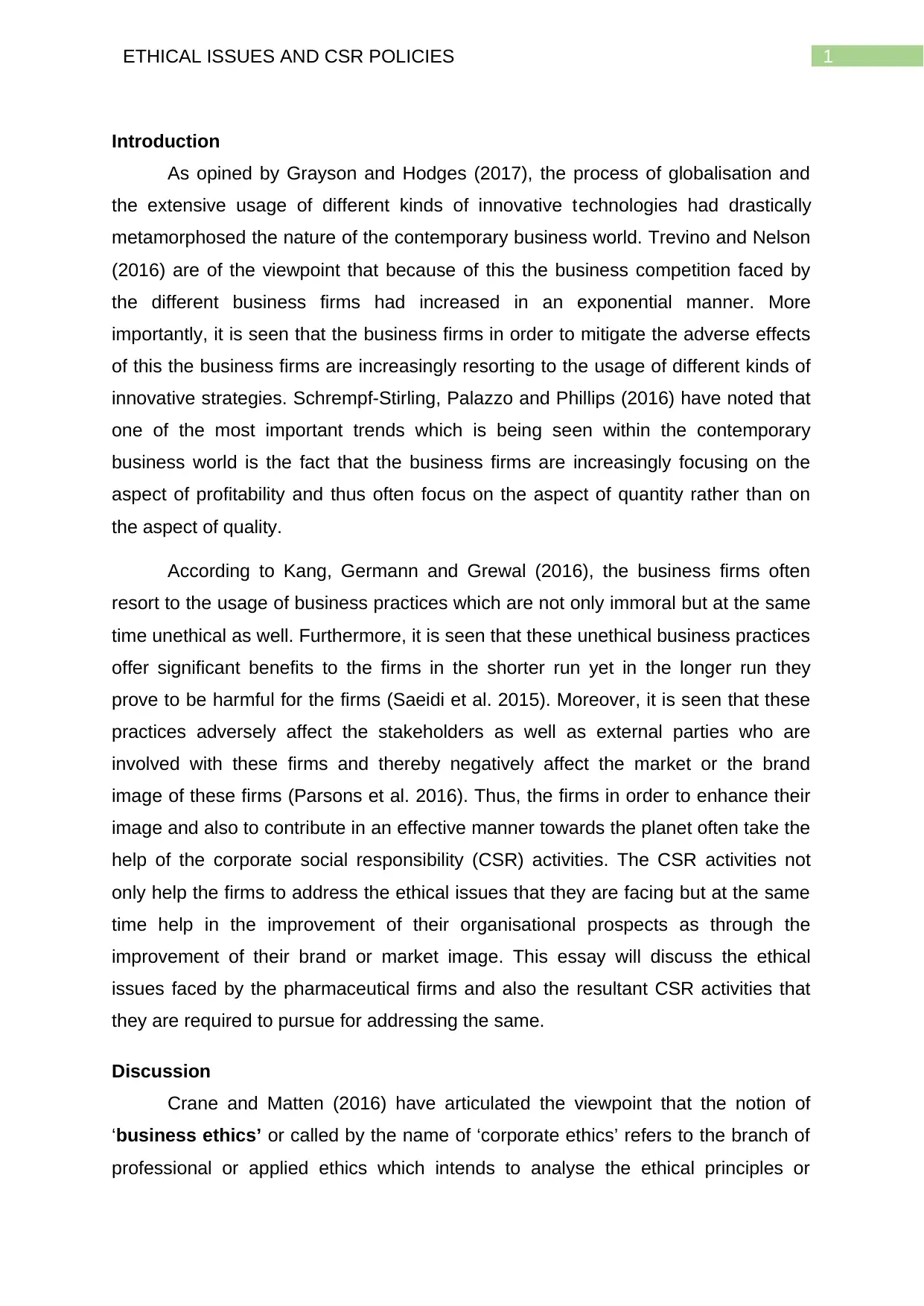
1ETHICAL ISSUES AND CSR POLICIES
Introduction
As opined by Grayson and Hodges (2017), the process of globalisation and
the extensive usage of different kinds of innovative technologies had drastically
metamorphosed the nature of the contemporary business world. Trevino and Nelson
(2016) are of the viewpoint that because of this the business competition faced by
the different business firms had increased in an exponential manner. More
importantly, it is seen that the business firms in order to mitigate the adverse effects
of this the business firms are increasingly resorting to the usage of different kinds of
innovative strategies. Schrempf-Stirling, Palazzo and Phillips (2016) have noted that
one of the most important trends which is being seen within the contemporary
business world is the fact that the business firms are increasingly focusing on the
aspect of profitability and thus often focus on the aspect of quantity rather than on
the aspect of quality.
According to Kang, Germann and Grewal (2016), the business firms often
resort to the usage of business practices which are not only immoral but at the same
time unethical as well. Furthermore, it is seen that these unethical business practices
offer significant benefits to the firms in the shorter run yet in the longer run they
prove to be harmful for the firms (Saeidi et al. 2015). Moreover, it is seen that these
practices adversely affect the stakeholders as well as external parties who are
involved with these firms and thereby negatively affect the market or the brand
image of these firms (Parsons et al. 2016). Thus, the firms in order to enhance their
image and also to contribute in an effective manner towards the planet often take the
help of the corporate social responsibility (CSR) activities. The CSR activities not
only help the firms to address the ethical issues that they are facing but at the same
time help in the improvement of their organisational prospects as through the
improvement of their brand or market image. This essay will discuss the ethical
issues faced by the pharmaceutical firms and also the resultant CSR activities that
they are required to pursue for addressing the same.
Discussion
Crane and Matten (2016) have articulated the viewpoint that the notion of
‘business ethics’ or called by the name of ‘corporate ethics’ refers to the branch of
professional or applied ethics which intends to analyse the ethical principles or
Introduction
As opined by Grayson and Hodges (2017), the process of globalisation and
the extensive usage of different kinds of innovative technologies had drastically
metamorphosed the nature of the contemporary business world. Trevino and Nelson
(2016) are of the viewpoint that because of this the business competition faced by
the different business firms had increased in an exponential manner. More
importantly, it is seen that the business firms in order to mitigate the adverse effects
of this the business firms are increasingly resorting to the usage of different kinds of
innovative strategies. Schrempf-Stirling, Palazzo and Phillips (2016) have noted that
one of the most important trends which is being seen within the contemporary
business world is the fact that the business firms are increasingly focusing on the
aspect of profitability and thus often focus on the aspect of quantity rather than on
the aspect of quality.
According to Kang, Germann and Grewal (2016), the business firms often
resort to the usage of business practices which are not only immoral but at the same
time unethical as well. Furthermore, it is seen that these unethical business practices
offer significant benefits to the firms in the shorter run yet in the longer run they
prove to be harmful for the firms (Saeidi et al. 2015). Moreover, it is seen that these
practices adversely affect the stakeholders as well as external parties who are
involved with these firms and thereby negatively affect the market or the brand
image of these firms (Parsons et al. 2016). Thus, the firms in order to enhance their
image and also to contribute in an effective manner towards the planet often take the
help of the corporate social responsibility (CSR) activities. The CSR activities not
only help the firms to address the ethical issues that they are facing but at the same
time help in the improvement of their organisational prospects as through the
improvement of their brand or market image. This essay will discuss the ethical
issues faced by the pharmaceutical firms and also the resultant CSR activities that
they are required to pursue for addressing the same.
Discussion
Crane and Matten (2016) have articulated the viewpoint that the notion of
‘business ethics’ or called by the name of ‘corporate ethics’ refers to the branch of
professional or applied ethics which intends to analyse the ethical principles or
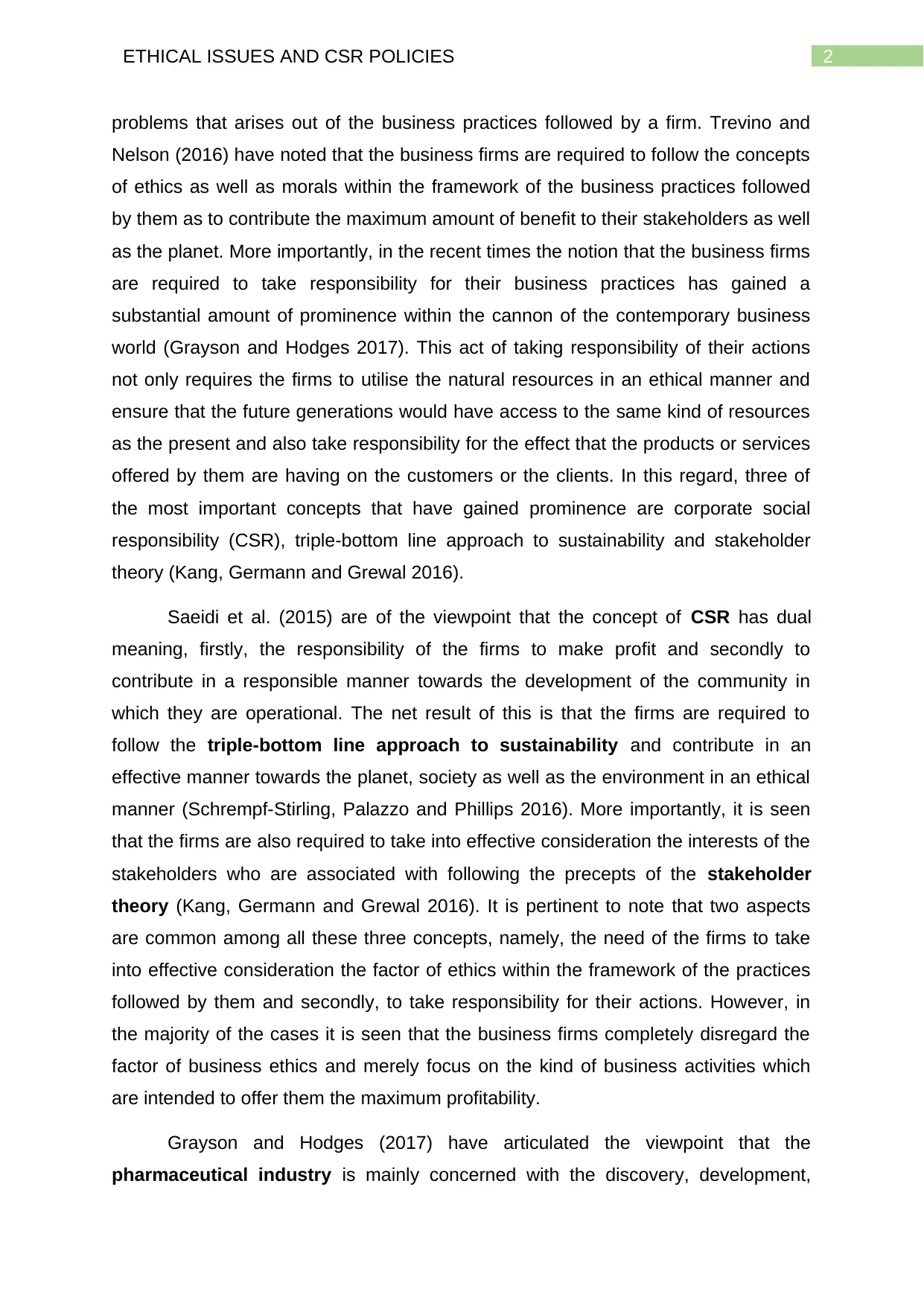
2ETHICAL ISSUES AND CSR POLICIES
problems that arises out of the business practices followed by a firm. Trevino and
Nelson (2016) have noted that the business firms are required to follow the concepts
of ethics as well as morals within the framework of the business practices followed
by them as to contribute the maximum amount of benefit to their stakeholders as well
as the planet. More importantly, in the recent times the notion that the business firms
are required to take responsibility for their business practices has gained a
substantial amount of prominence within the cannon of the contemporary business
world (Grayson and Hodges 2017). This act of taking responsibility of their actions
not only requires the firms to utilise the natural resources in an ethical manner and
ensure that the future generations would have access to the same kind of resources
as the present and also take responsibility for the effect that the products or services
offered by them are having on the customers or the clients. In this regard, three of
the most important concepts that have gained prominence are corporate social
responsibility (CSR), triple-bottom line approach to sustainability and stakeholder
theory (Kang, Germann and Grewal 2016).
Saeidi et al. (2015) are of the viewpoint that the concept of CSR has dual
meaning, firstly, the responsibility of the firms to make profit and secondly to
contribute in a responsible manner towards the development of the community in
which they are operational. The net result of this is that the firms are required to
follow the triple-bottom line approach to sustainability and contribute in an
effective manner towards the planet, society as well as the environment in an ethical
manner (Schrempf-Stirling, Palazzo and Phillips 2016). More importantly, it is seen
that the firms are also required to take into effective consideration the interests of the
stakeholders who are associated with following the precepts of the stakeholder
theory (Kang, Germann and Grewal 2016). It is pertinent to note that two aspects
are common among all these three concepts, namely, the need of the firms to take
into effective consideration the factor of ethics within the framework of the practices
followed by them and secondly, to take responsibility for their actions. However, in
the majority of the cases it is seen that the business firms completely disregard the
factor of business ethics and merely focus on the kind of business activities which
are intended to offer them the maximum profitability.
Grayson and Hodges (2017) have articulated the viewpoint that the
pharmaceutical industry is mainly concerned with the discovery, development,
problems that arises out of the business practices followed by a firm. Trevino and
Nelson (2016) have noted that the business firms are required to follow the concepts
of ethics as well as morals within the framework of the business practices followed
by them as to contribute the maximum amount of benefit to their stakeholders as well
as the planet. More importantly, in the recent times the notion that the business firms
are required to take responsibility for their business practices has gained a
substantial amount of prominence within the cannon of the contemporary business
world (Grayson and Hodges 2017). This act of taking responsibility of their actions
not only requires the firms to utilise the natural resources in an ethical manner and
ensure that the future generations would have access to the same kind of resources
as the present and also take responsibility for the effect that the products or services
offered by them are having on the customers or the clients. In this regard, three of
the most important concepts that have gained prominence are corporate social
responsibility (CSR), triple-bottom line approach to sustainability and stakeholder
theory (Kang, Germann and Grewal 2016).
Saeidi et al. (2015) are of the viewpoint that the concept of CSR has dual
meaning, firstly, the responsibility of the firms to make profit and secondly to
contribute in a responsible manner towards the development of the community in
which they are operational. The net result of this is that the firms are required to
follow the triple-bottom line approach to sustainability and contribute in an
effective manner towards the planet, society as well as the environment in an ethical
manner (Schrempf-Stirling, Palazzo and Phillips 2016). More importantly, it is seen
that the firms are also required to take into effective consideration the interests of the
stakeholders who are associated with following the precepts of the stakeholder
theory (Kang, Germann and Grewal 2016). It is pertinent to note that two aspects
are common among all these three concepts, namely, the need of the firms to take
into effective consideration the factor of ethics within the framework of the practices
followed by them and secondly, to take responsibility for their actions. However, in
the majority of the cases it is seen that the business firms completely disregard the
factor of business ethics and merely focus on the kind of business activities which
are intended to offer them the maximum profitability.
Grayson and Hodges (2017) have articulated the viewpoint that the
pharmaceutical industry is mainly concerned with the discovery, development,
⊘ This is a preview!⊘
Do you want full access?
Subscribe today to unlock all pages.

Trusted by 1+ million students worldwide
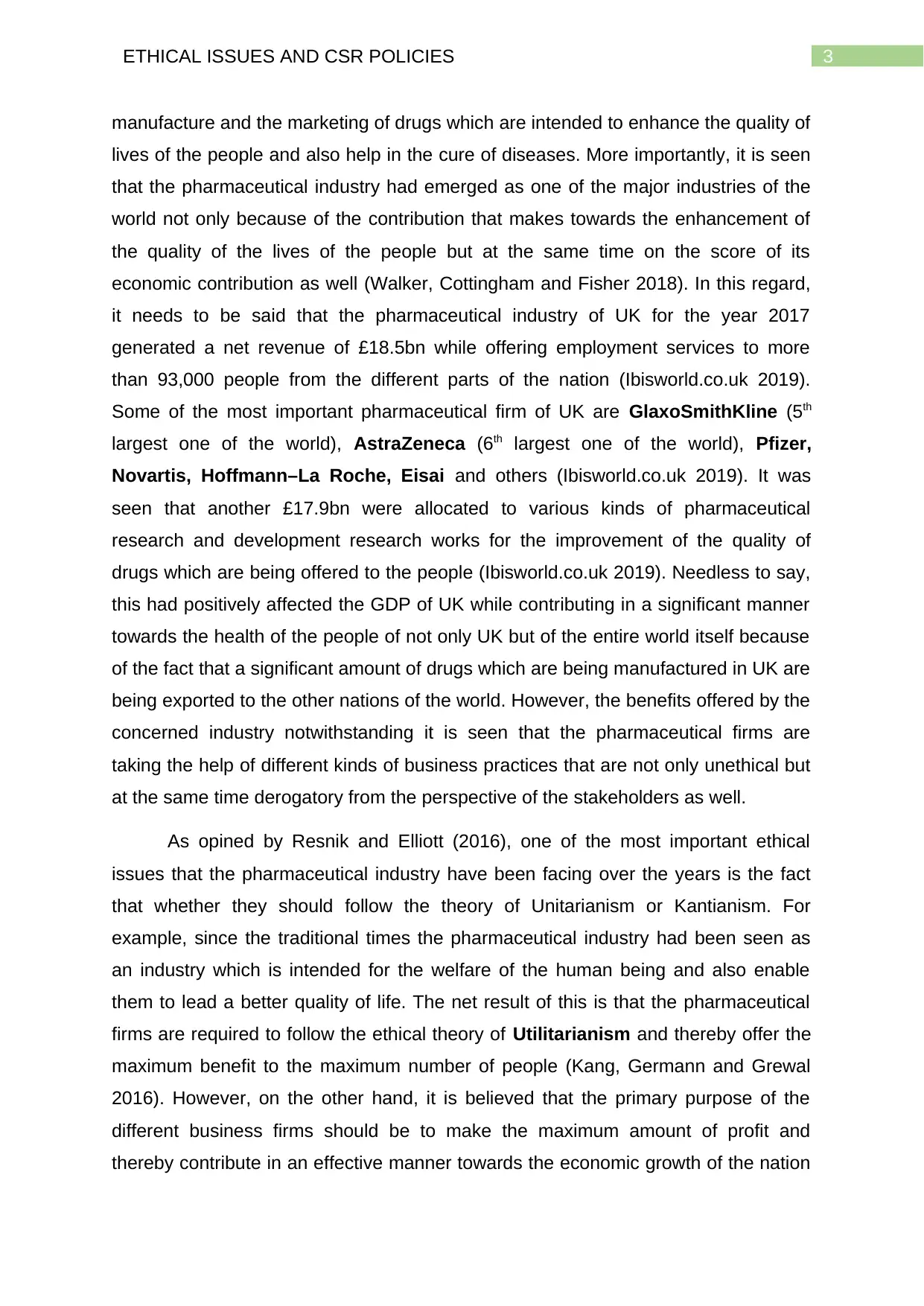
3ETHICAL ISSUES AND CSR POLICIES
manufacture and the marketing of drugs which are intended to enhance the quality of
lives of the people and also help in the cure of diseases. More importantly, it is seen
that the pharmaceutical industry had emerged as one of the major industries of the
world not only because of the contribution that makes towards the enhancement of
the quality of the lives of the people but at the same time on the score of its
economic contribution as well (Walker, Cottingham and Fisher 2018). In this regard,
it needs to be said that the pharmaceutical industry of UK for the year 2017
generated a net revenue of £18.5bn while offering employment services to more
than 93,000 people from the different parts of the nation (Ibisworld.co.uk 2019).
Some of the most important pharmaceutical firm of UK are GlaxoSmithKline (5th
largest one of the world), AstraZeneca (6th largest one of the world), Pfizer,
Novartis, Hoffmann–La Roche, Eisai and others (Ibisworld.co.uk 2019). It was
seen that another £17.9bn were allocated to various kinds of pharmaceutical
research and development research works for the improvement of the quality of
drugs which are being offered to the people (Ibisworld.co.uk 2019). Needless to say,
this had positively affected the GDP of UK while contributing in a significant manner
towards the health of the people of not only UK but of the entire world itself because
of the fact that a significant amount of drugs which are being manufactured in UK are
being exported to the other nations of the world. However, the benefits offered by the
concerned industry notwithstanding it is seen that the pharmaceutical firms are
taking the help of different kinds of business practices that are not only unethical but
at the same time derogatory from the perspective of the stakeholders as well.
As opined by Resnik and Elliott (2016), one of the most important ethical
issues that the pharmaceutical industry have been facing over the years is the fact
that whether they should follow the theory of Unitarianism or Kantianism. For
example, since the traditional times the pharmaceutical industry had been seen as
an industry which is intended for the welfare of the human being and also enable
them to lead a better quality of life. The net result of this is that the pharmaceutical
firms are required to follow the ethical theory of Utilitarianism and thereby offer the
maximum benefit to the maximum number of people (Kang, Germann and Grewal
2016). However, on the other hand, it is believed that the primary purpose of the
different business firms should be to make the maximum amount of profit and
thereby contribute in an effective manner towards the economic growth of the nation
manufacture and the marketing of drugs which are intended to enhance the quality of
lives of the people and also help in the cure of diseases. More importantly, it is seen
that the pharmaceutical industry had emerged as one of the major industries of the
world not only because of the contribution that makes towards the enhancement of
the quality of the lives of the people but at the same time on the score of its
economic contribution as well (Walker, Cottingham and Fisher 2018). In this regard,
it needs to be said that the pharmaceutical industry of UK for the year 2017
generated a net revenue of £18.5bn while offering employment services to more
than 93,000 people from the different parts of the nation (Ibisworld.co.uk 2019).
Some of the most important pharmaceutical firm of UK are GlaxoSmithKline (5th
largest one of the world), AstraZeneca (6th largest one of the world), Pfizer,
Novartis, Hoffmann–La Roche, Eisai and others (Ibisworld.co.uk 2019). It was
seen that another £17.9bn were allocated to various kinds of pharmaceutical
research and development research works for the improvement of the quality of
drugs which are being offered to the people (Ibisworld.co.uk 2019). Needless to say,
this had positively affected the GDP of UK while contributing in a significant manner
towards the health of the people of not only UK but of the entire world itself because
of the fact that a significant amount of drugs which are being manufactured in UK are
being exported to the other nations of the world. However, the benefits offered by the
concerned industry notwithstanding it is seen that the pharmaceutical firms are
taking the help of different kinds of business practices that are not only unethical but
at the same time derogatory from the perspective of the stakeholders as well.
As opined by Resnik and Elliott (2016), one of the most important ethical
issues that the pharmaceutical industry have been facing over the years is the fact
that whether they should follow the theory of Unitarianism or Kantianism. For
example, since the traditional times the pharmaceutical industry had been seen as
an industry which is intended for the welfare of the human being and also enable
them to lead a better quality of life. The net result of this is that the pharmaceutical
firms are required to follow the ethical theory of Utilitarianism and thereby offer the
maximum benefit to the maximum number of people (Kang, Germann and Grewal
2016). However, on the other hand, it is believed that the primary purpose of the
different business firms should be to make the maximum amount of profit and
thereby contribute in an effective manner towards the economic growth of the nation
Paraphrase This Document
Need a fresh take? Get an instant paraphrase of this document with our AI Paraphraser
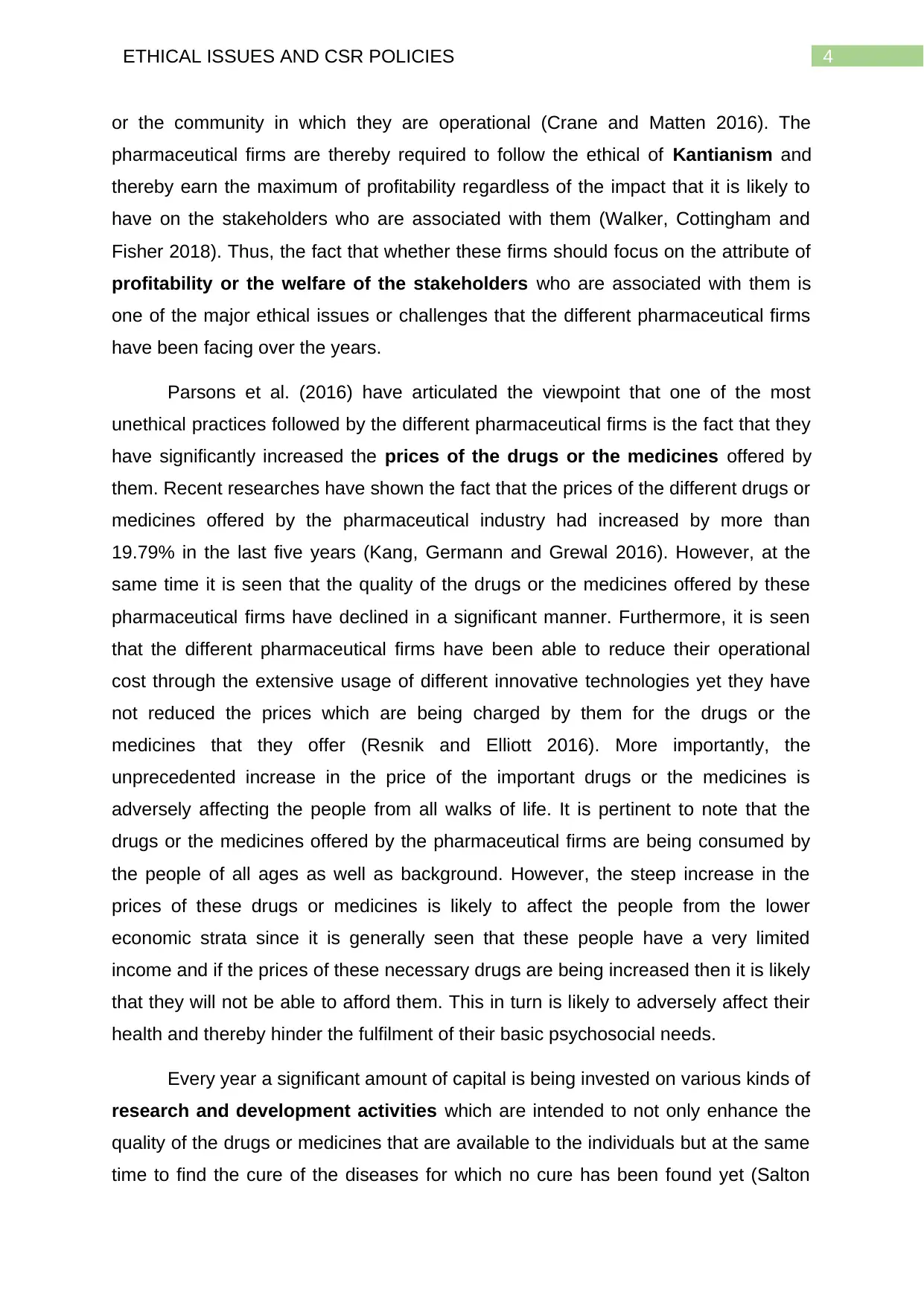
4ETHICAL ISSUES AND CSR POLICIES
or the community in which they are operational (Crane and Matten 2016). The
pharmaceutical firms are thereby required to follow the ethical of Kantianism and
thereby earn the maximum of profitability regardless of the impact that it is likely to
have on the stakeholders who are associated with them (Walker, Cottingham and
Fisher 2018). Thus, the fact that whether these firms should focus on the attribute of
profitability or the welfare of the stakeholders who are associated with them is
one of the major ethical issues or challenges that the different pharmaceutical firms
have been facing over the years.
Parsons et al. (2016) have articulated the viewpoint that one of the most
unethical practices followed by the different pharmaceutical firms is the fact that they
have significantly increased the prices of the drugs or the medicines offered by
them. Recent researches have shown the fact that the prices of the different drugs or
medicines offered by the pharmaceutical industry had increased by more than
19.79% in the last five years (Kang, Germann and Grewal 2016). However, at the
same time it is seen that the quality of the drugs or the medicines offered by these
pharmaceutical firms have declined in a significant manner. Furthermore, it is seen
that the different pharmaceutical firms have been able to reduce their operational
cost through the extensive usage of different innovative technologies yet they have
not reduced the prices which are being charged by them for the drugs or the
medicines that they offer (Resnik and Elliott 2016). More importantly, the
unprecedented increase in the price of the important drugs or the medicines is
adversely affecting the people from all walks of life. It is pertinent to note that the
drugs or the medicines offered by the pharmaceutical firms are being consumed by
the people of all ages as well as background. However, the steep increase in the
prices of these drugs or medicines is likely to affect the people from the lower
economic strata since it is generally seen that these people have a very limited
income and if the prices of these necessary drugs are being increased then it is likely
that they will not be able to afford them. This in turn is likely to adversely affect their
health and thereby hinder the fulfilment of their basic psychosocial needs.
Every year a significant amount of capital is being invested on various kinds of
research and development activities which are intended to not only enhance the
quality of the drugs or medicines that are available to the individuals but at the same
time to find the cure of the diseases for which no cure has been found yet (Salton
or the community in which they are operational (Crane and Matten 2016). The
pharmaceutical firms are thereby required to follow the ethical of Kantianism and
thereby earn the maximum of profitability regardless of the impact that it is likely to
have on the stakeholders who are associated with them (Walker, Cottingham and
Fisher 2018). Thus, the fact that whether these firms should focus on the attribute of
profitability or the welfare of the stakeholders who are associated with them is
one of the major ethical issues or challenges that the different pharmaceutical firms
have been facing over the years.
Parsons et al. (2016) have articulated the viewpoint that one of the most
unethical practices followed by the different pharmaceutical firms is the fact that they
have significantly increased the prices of the drugs or the medicines offered by
them. Recent researches have shown the fact that the prices of the different drugs or
medicines offered by the pharmaceutical industry had increased by more than
19.79% in the last five years (Kang, Germann and Grewal 2016). However, at the
same time it is seen that the quality of the drugs or the medicines offered by these
pharmaceutical firms have declined in a significant manner. Furthermore, it is seen
that the different pharmaceutical firms have been able to reduce their operational
cost through the extensive usage of different innovative technologies yet they have
not reduced the prices which are being charged by them for the drugs or the
medicines that they offer (Resnik and Elliott 2016). More importantly, the
unprecedented increase in the price of the important drugs or the medicines is
adversely affecting the people from all walks of life. It is pertinent to note that the
drugs or the medicines offered by the pharmaceutical firms are being consumed by
the people of all ages as well as background. However, the steep increase in the
prices of these drugs or medicines is likely to affect the people from the lower
economic strata since it is generally seen that these people have a very limited
income and if the prices of these necessary drugs are being increased then it is likely
that they will not be able to afford them. This in turn is likely to adversely affect their
health and thereby hinder the fulfilment of their basic psychosocial needs.
Every year a significant amount of capital is being invested on various kinds of
research and development activities which are intended to not only enhance the
quality of the drugs or medicines that are available to the individuals but at the same
time to find the cure of the diseases for which no cure has been found yet (Salton
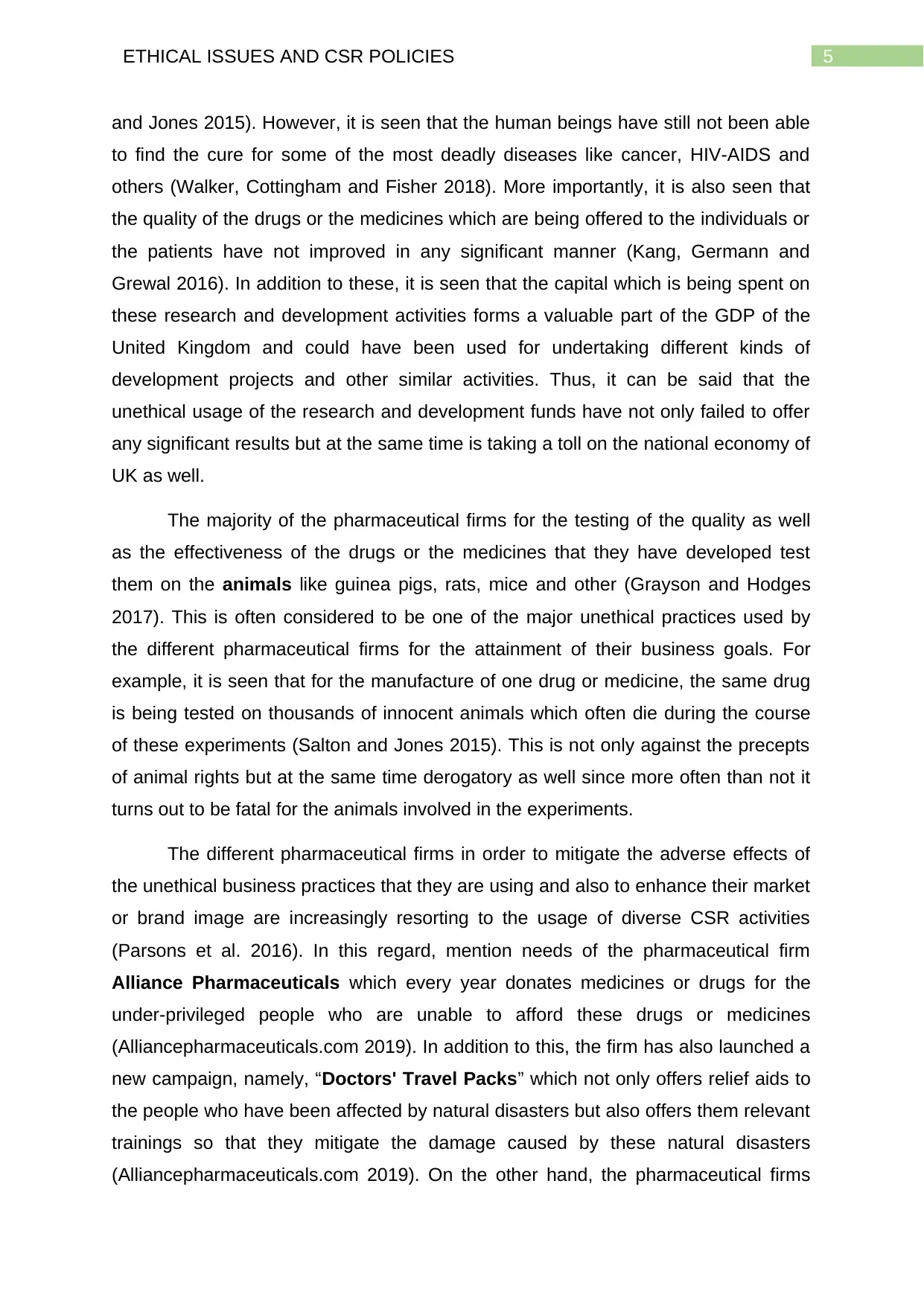
5ETHICAL ISSUES AND CSR POLICIES
and Jones 2015). However, it is seen that the human beings have still not been able
to find the cure for some of the most deadly diseases like cancer, HIV-AIDS and
others (Walker, Cottingham and Fisher 2018). More importantly, it is also seen that
the quality of the drugs or the medicines which are being offered to the individuals or
the patients have not improved in any significant manner (Kang, Germann and
Grewal 2016). In addition to these, it is seen that the capital which is being spent on
these research and development activities forms a valuable part of the GDP of the
United Kingdom and could have been used for undertaking different kinds of
development projects and other similar activities. Thus, it can be said that the
unethical usage of the research and development funds have not only failed to offer
any significant results but at the same time is taking a toll on the national economy of
UK as well.
The majority of the pharmaceutical firms for the testing of the quality as well
as the effectiveness of the drugs or the medicines that they have developed test
them on the animals like guinea pigs, rats, mice and other (Grayson and Hodges
2017). This is often considered to be one of the major unethical practices used by
the different pharmaceutical firms for the attainment of their business goals. For
example, it is seen that for the manufacture of one drug or medicine, the same drug
is being tested on thousands of innocent animals which often die during the course
of these experiments (Salton and Jones 2015). This is not only against the precepts
of animal rights but at the same time derogatory as well since more often than not it
turns out to be fatal for the animals involved in the experiments.
The different pharmaceutical firms in order to mitigate the adverse effects of
the unethical business practices that they are using and also to enhance their market
or brand image are increasingly resorting to the usage of diverse CSR activities
(Parsons et al. 2016). In this regard, mention needs of the pharmaceutical firm
Alliance Pharmaceuticals which every year donates medicines or drugs for the
under-privileged people who are unable to afford these drugs or medicines
(Alliancepharmaceuticals.com 2019). In addition to this, the firm has also launched a
new campaign, namely, “Doctors' Travel Packs” which not only offers relief aids to
the people who have been affected by natural disasters but also offers them relevant
trainings so that they mitigate the damage caused by these natural disasters
(Alliancepharmaceuticals.com 2019). On the other hand, the pharmaceutical firms
and Jones 2015). However, it is seen that the human beings have still not been able
to find the cure for some of the most deadly diseases like cancer, HIV-AIDS and
others (Walker, Cottingham and Fisher 2018). More importantly, it is also seen that
the quality of the drugs or the medicines which are being offered to the individuals or
the patients have not improved in any significant manner (Kang, Germann and
Grewal 2016). In addition to these, it is seen that the capital which is being spent on
these research and development activities forms a valuable part of the GDP of the
United Kingdom and could have been used for undertaking different kinds of
development projects and other similar activities. Thus, it can be said that the
unethical usage of the research and development funds have not only failed to offer
any significant results but at the same time is taking a toll on the national economy of
UK as well.
The majority of the pharmaceutical firms for the testing of the quality as well
as the effectiveness of the drugs or the medicines that they have developed test
them on the animals like guinea pigs, rats, mice and other (Grayson and Hodges
2017). This is often considered to be one of the major unethical practices used by
the different pharmaceutical firms for the attainment of their business goals. For
example, it is seen that for the manufacture of one drug or medicine, the same drug
is being tested on thousands of innocent animals which often die during the course
of these experiments (Salton and Jones 2015). This is not only against the precepts
of animal rights but at the same time derogatory as well since more often than not it
turns out to be fatal for the animals involved in the experiments.
The different pharmaceutical firms in order to mitigate the adverse effects of
the unethical business practices that they are using and also to enhance their market
or brand image are increasingly resorting to the usage of diverse CSR activities
(Parsons et al. 2016). In this regard, mention needs of the pharmaceutical firm
Alliance Pharmaceuticals which every year donates medicines or drugs for the
under-privileged people who are unable to afford these drugs or medicines
(Alliancepharmaceuticals.com 2019). In addition to this, the firm has also launched a
new campaign, namely, “Doctors' Travel Packs” which not only offers relief aids to
the people who have been affected by natural disasters but also offers them relevant
trainings so that they mitigate the damage caused by these natural disasters
(Alliancepharmaceuticals.com 2019). On the other hand, the pharmaceutical firms
⊘ This is a preview!⊘
Do you want full access?
Subscribe today to unlock all pages.

Trusted by 1+ million students worldwide
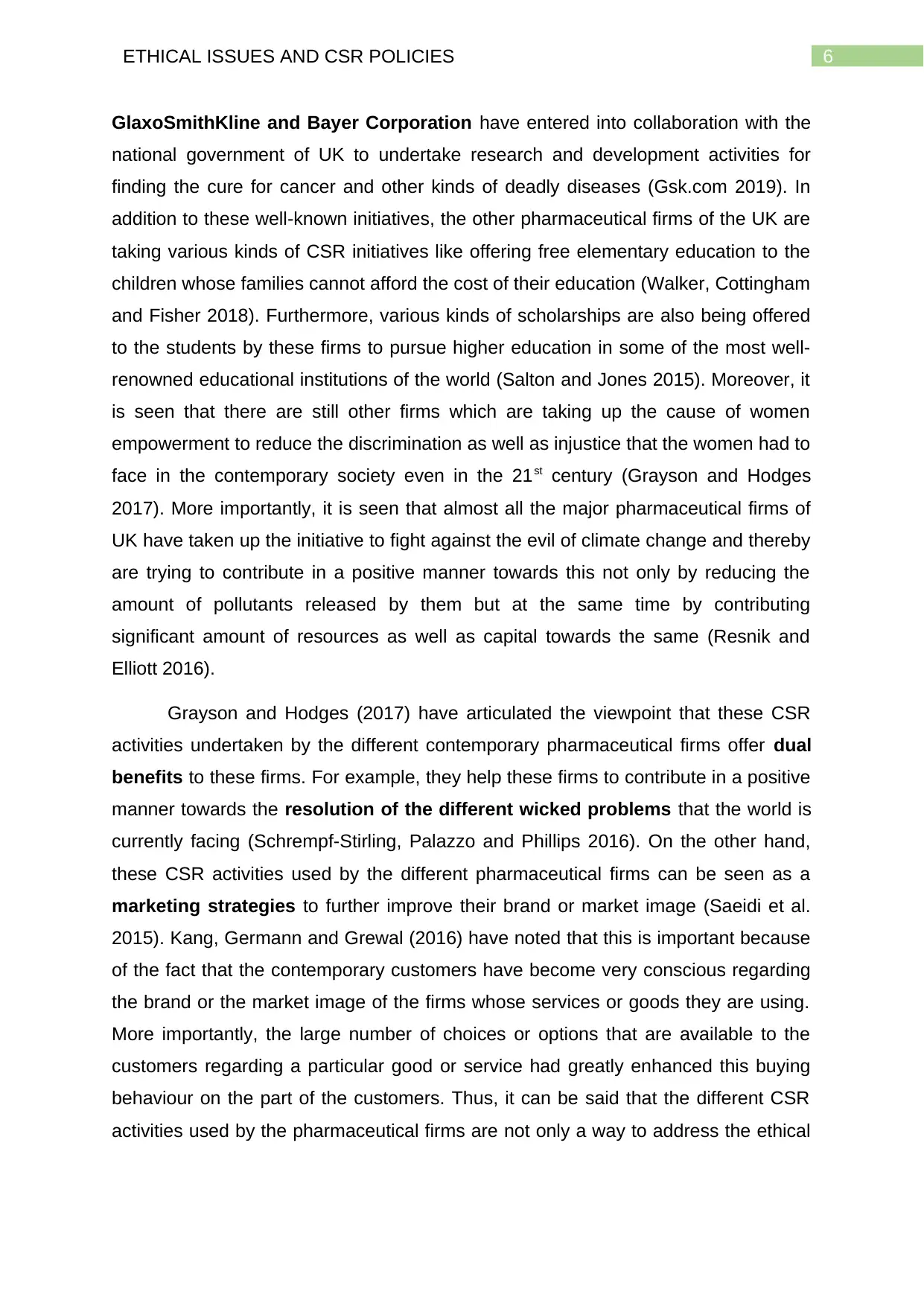
6ETHICAL ISSUES AND CSR POLICIES
GlaxoSmithKline and Bayer Corporation have entered into collaboration with the
national government of UK to undertake research and development activities for
finding the cure for cancer and other kinds of deadly diseases (Gsk.com 2019). In
addition to these well-known initiatives, the other pharmaceutical firms of the UK are
taking various kinds of CSR initiatives like offering free elementary education to the
children whose families cannot afford the cost of their education (Walker, Cottingham
and Fisher 2018). Furthermore, various kinds of scholarships are also being offered
to the students by these firms to pursue higher education in some of the most well-
renowned educational institutions of the world (Salton and Jones 2015). Moreover, it
is seen that there are still other firms which are taking up the cause of women
empowerment to reduce the discrimination as well as injustice that the women had to
face in the contemporary society even in the 21st century (Grayson and Hodges
2017). More importantly, it is seen that almost all the major pharmaceutical firms of
UK have taken up the initiative to fight against the evil of climate change and thereby
are trying to contribute in a positive manner towards this not only by reducing the
amount of pollutants released by them but at the same time by contributing
significant amount of resources as well as capital towards the same (Resnik and
Elliott 2016).
Grayson and Hodges (2017) have articulated the viewpoint that these CSR
activities undertaken by the different contemporary pharmaceutical firms offer dual
benefits to these firms. For example, they help these firms to contribute in a positive
manner towards the resolution of the different wicked problems that the world is
currently facing (Schrempf-Stirling, Palazzo and Phillips 2016). On the other hand,
these CSR activities used by the different pharmaceutical firms can be seen as a
marketing strategies to further improve their brand or market image (Saeidi et al.
2015). Kang, Germann and Grewal (2016) have noted that this is important because
of the fact that the contemporary customers have become very conscious regarding
the brand or the market image of the firms whose services or goods they are using.
More importantly, the large number of choices or options that are available to the
customers regarding a particular good or service had greatly enhanced this buying
behaviour on the part of the customers. Thus, it can be said that the different CSR
activities used by the pharmaceutical firms are not only a way to address the ethical
GlaxoSmithKline and Bayer Corporation have entered into collaboration with the
national government of UK to undertake research and development activities for
finding the cure for cancer and other kinds of deadly diseases (Gsk.com 2019). In
addition to these well-known initiatives, the other pharmaceutical firms of the UK are
taking various kinds of CSR initiatives like offering free elementary education to the
children whose families cannot afford the cost of their education (Walker, Cottingham
and Fisher 2018). Furthermore, various kinds of scholarships are also being offered
to the students by these firms to pursue higher education in some of the most well-
renowned educational institutions of the world (Salton and Jones 2015). Moreover, it
is seen that there are still other firms which are taking up the cause of women
empowerment to reduce the discrimination as well as injustice that the women had to
face in the contemporary society even in the 21st century (Grayson and Hodges
2017). More importantly, it is seen that almost all the major pharmaceutical firms of
UK have taken up the initiative to fight against the evil of climate change and thereby
are trying to contribute in a positive manner towards this not only by reducing the
amount of pollutants released by them but at the same time by contributing
significant amount of resources as well as capital towards the same (Resnik and
Elliott 2016).
Grayson and Hodges (2017) have articulated the viewpoint that these CSR
activities undertaken by the different contemporary pharmaceutical firms offer dual
benefits to these firms. For example, they help these firms to contribute in a positive
manner towards the resolution of the different wicked problems that the world is
currently facing (Schrempf-Stirling, Palazzo and Phillips 2016). On the other hand,
these CSR activities used by the different pharmaceutical firms can be seen as a
marketing strategies to further improve their brand or market image (Saeidi et al.
2015). Kang, Germann and Grewal (2016) have noted that this is important because
of the fact that the contemporary customers have become very conscious regarding
the brand or the market image of the firms whose services or goods they are using.
More importantly, the large number of choices or options that are available to the
customers regarding a particular good or service had greatly enhanced this buying
behaviour on the part of the customers. Thus, it can be said that the different CSR
activities used by the pharmaceutical firms are not only a way to address the ethical
Paraphrase This Document
Need a fresh take? Get an instant paraphrase of this document with our AI Paraphraser
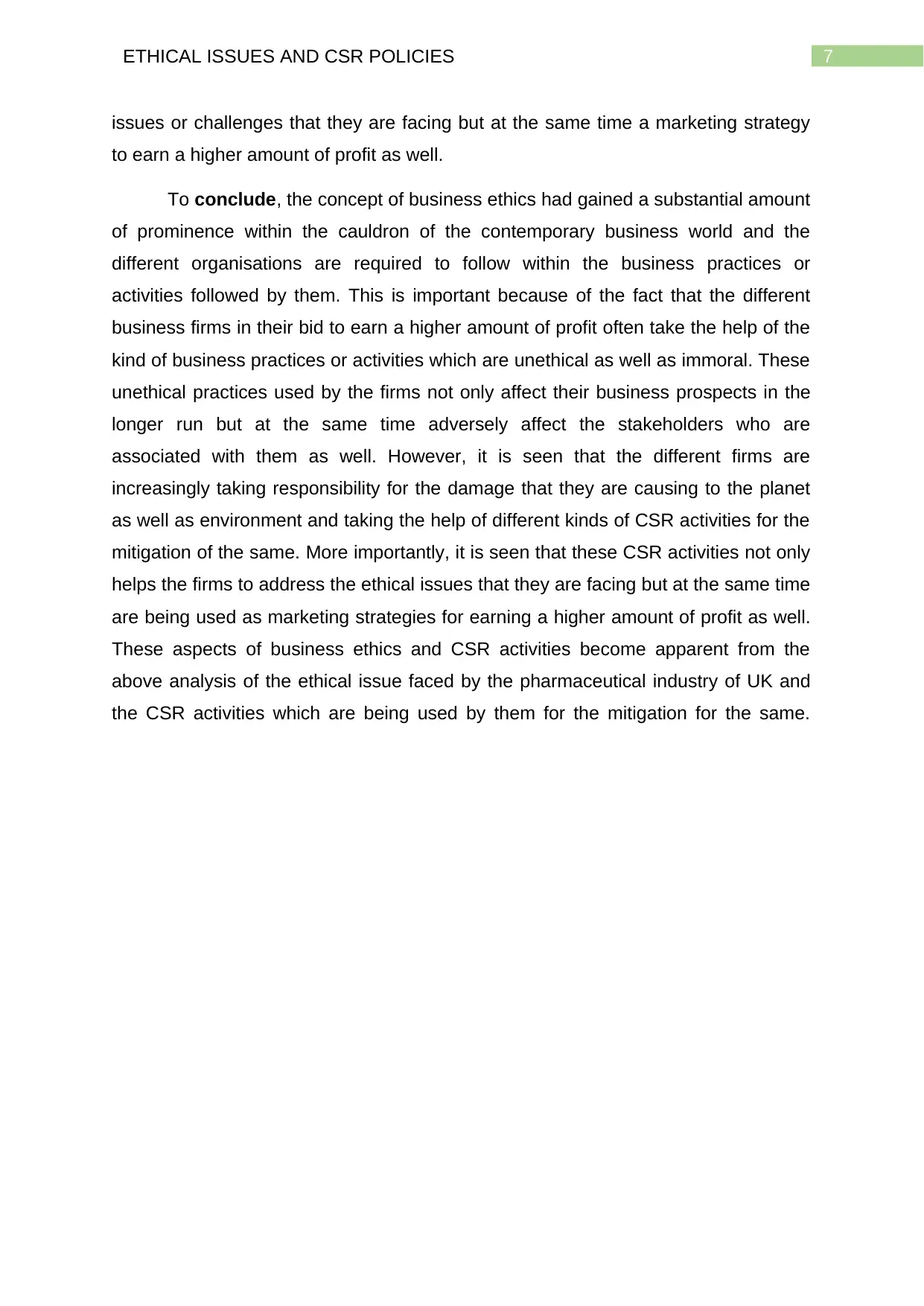
7ETHICAL ISSUES AND CSR POLICIES
issues or challenges that they are facing but at the same time a marketing strategy
to earn a higher amount of profit as well.
To conclude, the concept of business ethics had gained a substantial amount
of prominence within the cauldron of the contemporary business world and the
different organisations are required to follow within the business practices or
activities followed by them. This is important because of the fact that the different
business firms in their bid to earn a higher amount of profit often take the help of the
kind of business practices or activities which are unethical as well as immoral. These
unethical practices used by the firms not only affect their business prospects in the
longer run but at the same time adversely affect the stakeholders who are
associated with them as well. However, it is seen that the different firms are
increasingly taking responsibility for the damage that they are causing to the planet
as well as environment and taking the help of different kinds of CSR activities for the
mitigation of the same. More importantly, it is seen that these CSR activities not only
helps the firms to address the ethical issues that they are facing but at the same time
are being used as marketing strategies for earning a higher amount of profit as well.
These aspects of business ethics and CSR activities become apparent from the
above analysis of the ethical issue faced by the pharmaceutical industry of UK and
the CSR activities which are being used by them for the mitigation for the same.
issues or challenges that they are facing but at the same time a marketing strategy
to earn a higher amount of profit as well.
To conclude, the concept of business ethics had gained a substantial amount
of prominence within the cauldron of the contemporary business world and the
different organisations are required to follow within the business practices or
activities followed by them. This is important because of the fact that the different
business firms in their bid to earn a higher amount of profit often take the help of the
kind of business practices or activities which are unethical as well as immoral. These
unethical practices used by the firms not only affect their business prospects in the
longer run but at the same time adversely affect the stakeholders who are
associated with them as well. However, it is seen that the different firms are
increasingly taking responsibility for the damage that they are causing to the planet
as well as environment and taking the help of different kinds of CSR activities for the
mitigation of the same. More importantly, it is seen that these CSR activities not only
helps the firms to address the ethical issues that they are facing but at the same time
are being used as marketing strategies for earning a higher amount of profit as well.
These aspects of business ethics and CSR activities become apparent from the
above analysis of the ethical issue faced by the pharmaceutical industry of UK and
the CSR activities which are being used by them for the mitigation for the same.
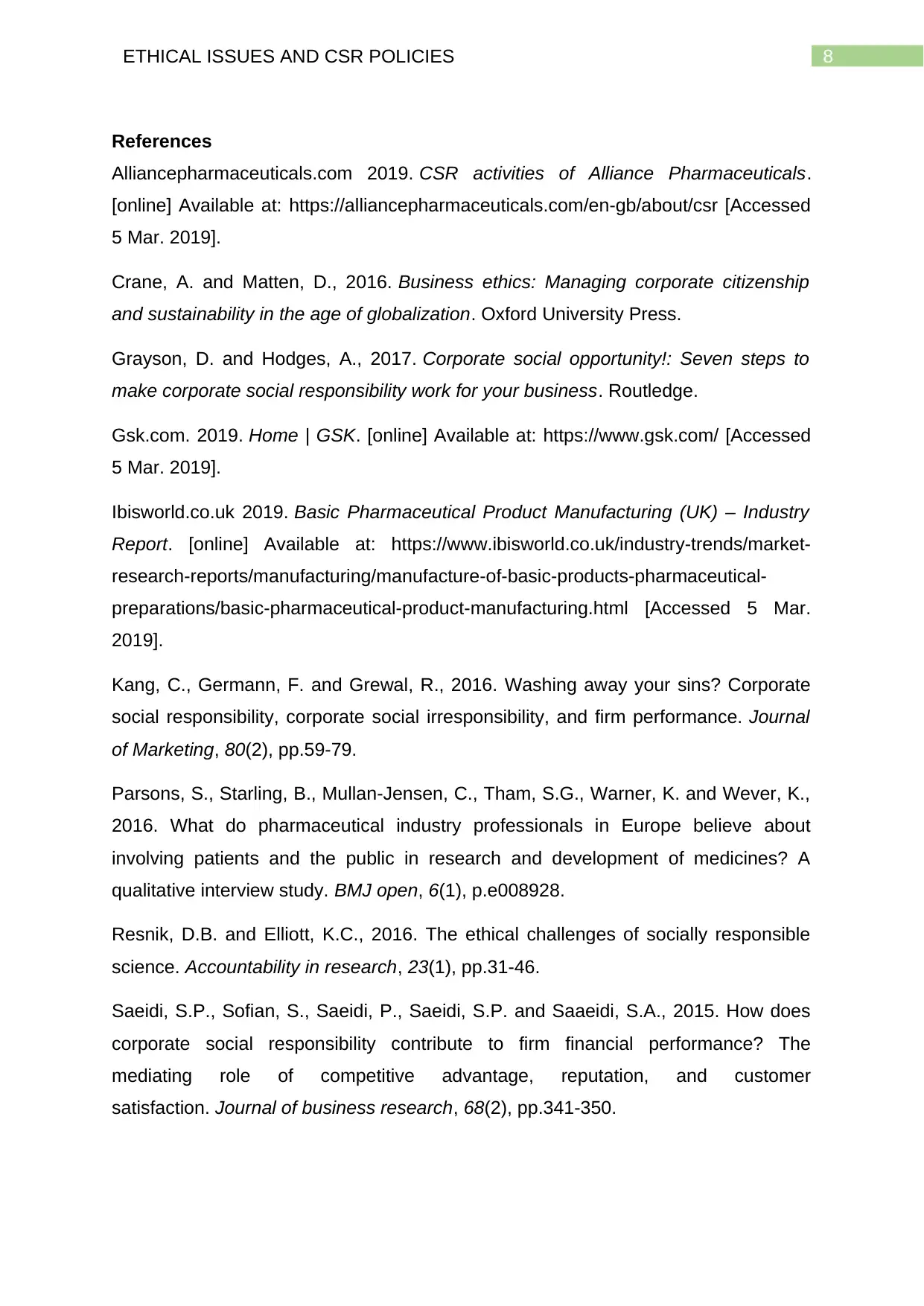
8ETHICAL ISSUES AND CSR POLICIES
References
Alliancepharmaceuticals.com 2019. CSR activities of Alliance Pharmaceuticals.
[online] Available at: https://alliancepharmaceuticals.com/en-gb/about/csr [Accessed
5 Mar. 2019].
Crane, A. and Matten, D., 2016. Business ethics: Managing corporate citizenship
and sustainability in the age of globalization. Oxford University Press.
Grayson, D. and Hodges, A., 2017. Corporate social opportunity!: Seven steps to
make corporate social responsibility work for your business. Routledge.
Gsk.com. 2019. Home | GSK. [online] Available at: https://www.gsk.com/ [Accessed
5 Mar. 2019].
Ibisworld.co.uk 2019. Basic Pharmaceutical Product Manufacturing (UK) – Industry
Report. [online] Available at: https://www.ibisworld.co.uk/industry-trends/market-
research-reports/manufacturing/manufacture-of-basic-products-pharmaceutical-
preparations/basic-pharmaceutical-product-manufacturing.html [Accessed 5 Mar.
2019].
Kang, C., Germann, F. and Grewal, R., 2016. Washing away your sins? Corporate
social responsibility, corporate social irresponsibility, and firm performance. Journal
of Marketing, 80(2), pp.59-79.
Parsons, S., Starling, B., Mullan-Jensen, C., Tham, S.G., Warner, K. and Wever, K.,
2016. What do pharmaceutical industry professionals in Europe believe about
involving patients and the public in research and development of medicines? A
qualitative interview study. BMJ open, 6(1), p.e008928.
Resnik, D.B. and Elliott, K.C., 2016. The ethical challenges of socially responsible
science. Accountability in research, 23(1), pp.31-46.
Saeidi, S.P., Sofian, S., Saeidi, P., Saeidi, S.P. and Saaeidi, S.A., 2015. How does
corporate social responsibility contribute to firm financial performance? The
mediating role of competitive advantage, reputation, and customer
satisfaction. Journal of business research, 68(2), pp.341-350.
References
Alliancepharmaceuticals.com 2019. CSR activities of Alliance Pharmaceuticals.
[online] Available at: https://alliancepharmaceuticals.com/en-gb/about/csr [Accessed
5 Mar. 2019].
Crane, A. and Matten, D., 2016. Business ethics: Managing corporate citizenship
and sustainability in the age of globalization. Oxford University Press.
Grayson, D. and Hodges, A., 2017. Corporate social opportunity!: Seven steps to
make corporate social responsibility work for your business. Routledge.
Gsk.com. 2019. Home | GSK. [online] Available at: https://www.gsk.com/ [Accessed
5 Mar. 2019].
Ibisworld.co.uk 2019. Basic Pharmaceutical Product Manufacturing (UK) – Industry
Report. [online] Available at: https://www.ibisworld.co.uk/industry-trends/market-
research-reports/manufacturing/manufacture-of-basic-products-pharmaceutical-
preparations/basic-pharmaceutical-product-manufacturing.html [Accessed 5 Mar.
2019].
Kang, C., Germann, F. and Grewal, R., 2016. Washing away your sins? Corporate
social responsibility, corporate social irresponsibility, and firm performance. Journal
of Marketing, 80(2), pp.59-79.
Parsons, S., Starling, B., Mullan-Jensen, C., Tham, S.G., Warner, K. and Wever, K.,
2016. What do pharmaceutical industry professionals in Europe believe about
involving patients and the public in research and development of medicines? A
qualitative interview study. BMJ open, 6(1), p.e008928.
Resnik, D.B. and Elliott, K.C., 2016. The ethical challenges of socially responsible
science. Accountability in research, 23(1), pp.31-46.
Saeidi, S.P., Sofian, S., Saeidi, P., Saeidi, S.P. and Saaeidi, S.A., 2015. How does
corporate social responsibility contribute to firm financial performance? The
mediating role of competitive advantage, reputation, and customer
satisfaction. Journal of business research, 68(2), pp.341-350.
⊘ This is a preview!⊘
Do you want full access?
Subscribe today to unlock all pages.

Trusted by 1+ million students worldwide
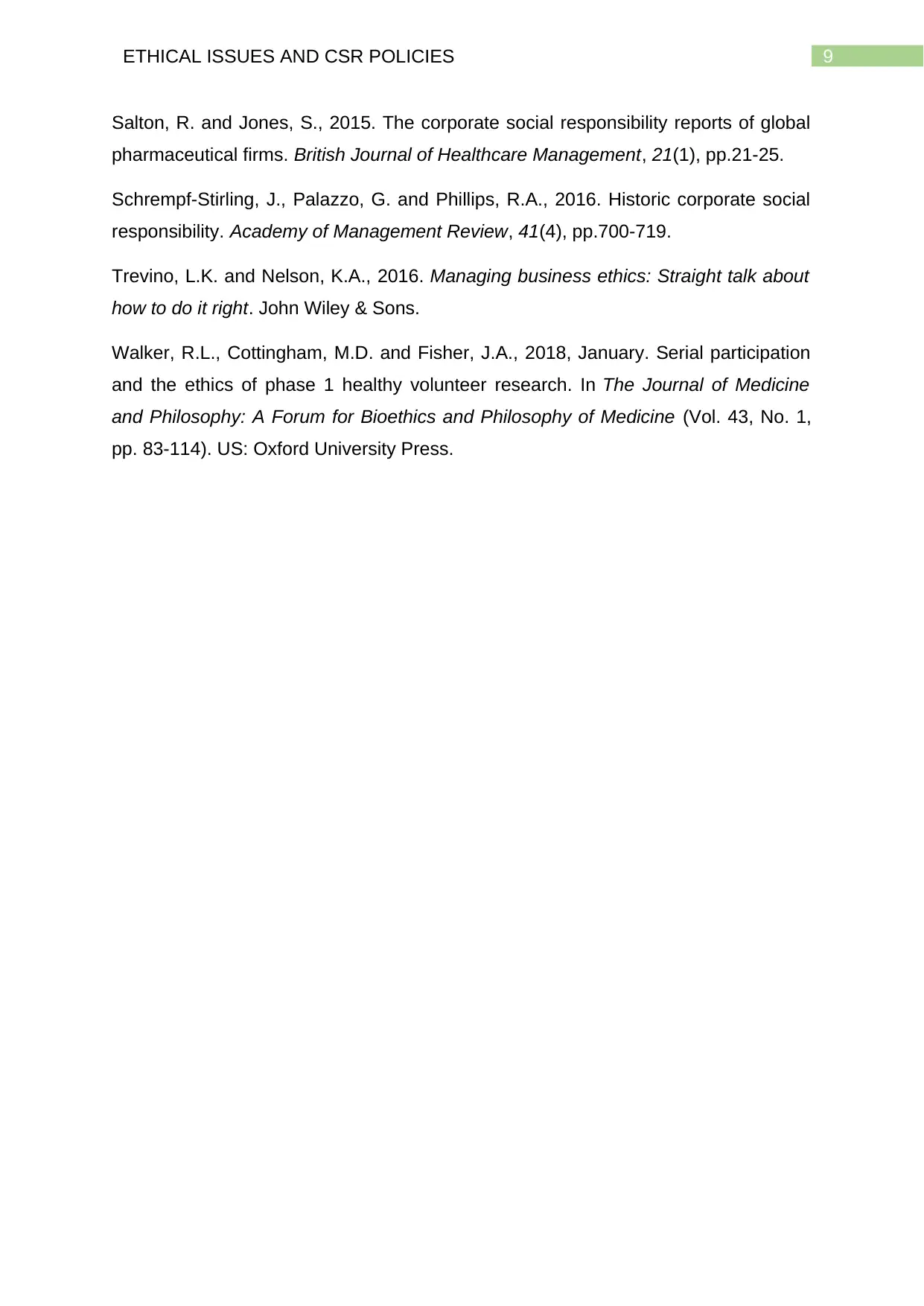
9ETHICAL ISSUES AND CSR POLICIES
Salton, R. and Jones, S., 2015. The corporate social responsibility reports of global
pharmaceutical firms. British Journal of Healthcare Management, 21(1), pp.21-25.
Schrempf-Stirling, J., Palazzo, G. and Phillips, R.A., 2016. Historic corporate social
responsibility. Academy of Management Review, 41(4), pp.700-719.
Trevino, L.K. and Nelson, K.A., 2016. Managing business ethics: Straight talk about
how to do it right. John Wiley & Sons.
Walker, R.L., Cottingham, M.D. and Fisher, J.A., 2018, January. Serial participation
and the ethics of phase 1 healthy volunteer research. In The Journal of Medicine
and Philosophy: A Forum for Bioethics and Philosophy of Medicine (Vol. 43, No. 1,
pp. 83-114). US: Oxford University Press.
Salton, R. and Jones, S., 2015. The corporate social responsibility reports of global
pharmaceutical firms. British Journal of Healthcare Management, 21(1), pp.21-25.
Schrempf-Stirling, J., Palazzo, G. and Phillips, R.A., 2016. Historic corporate social
responsibility. Academy of Management Review, 41(4), pp.700-719.
Trevino, L.K. and Nelson, K.A., 2016. Managing business ethics: Straight talk about
how to do it right. John Wiley & Sons.
Walker, R.L., Cottingham, M.D. and Fisher, J.A., 2018, January. Serial participation
and the ethics of phase 1 healthy volunteer research. In The Journal of Medicine
and Philosophy: A Forum for Bioethics and Philosophy of Medicine (Vol. 43, No. 1,
pp. 83-114). US: Oxford University Press.
1 out of 10
Related Documents
Your All-in-One AI-Powered Toolkit for Academic Success.
+13062052269
info@desklib.com
Available 24*7 on WhatsApp / Email
![[object Object]](/_next/static/media/star-bottom.7253800d.svg)
Unlock your academic potential
Copyright © 2020–2026 A2Z Services. All Rights Reserved. Developed and managed by ZUCOL.




